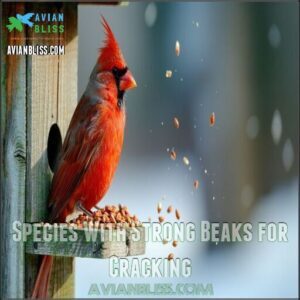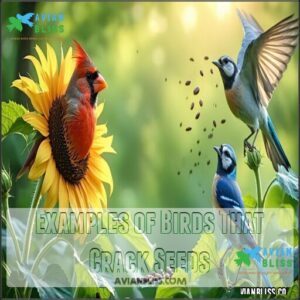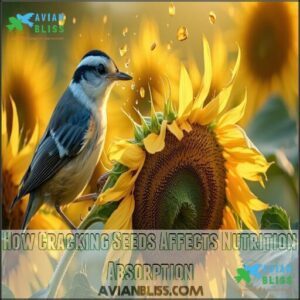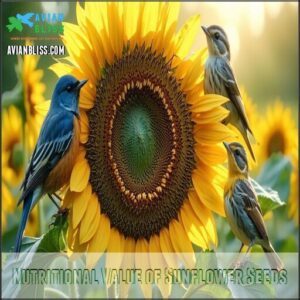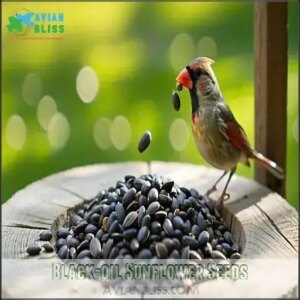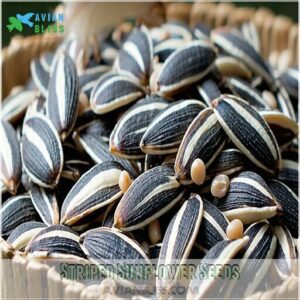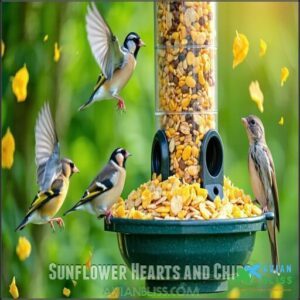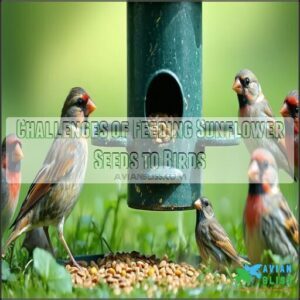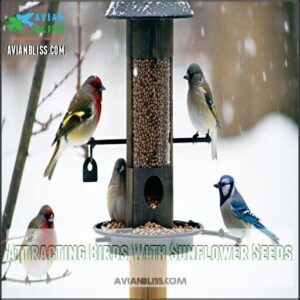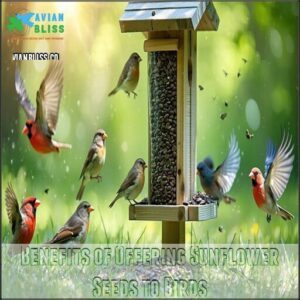This site is supported by our readers. We may earn a commission, at no cost to you, if you purchase through links.
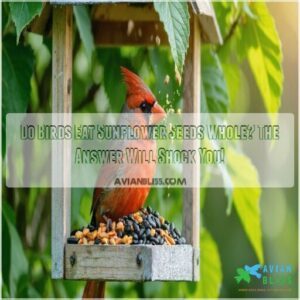
Birds like cardinals, chickadees, and finches have specialized beaks that work like nutcrackers. You’ll often find shell fragments scattered beneath your feeder as evidence of their work.
Some smaller birds with less powerful beaks may occasionally swallow black oil sunflower seeds whole, but this isn’t their preferred method. Each species has developed its own technique for tackling these popular seeds, from the methodical peck-and-extract approach to the quick shell-splitting maneuver that experienced seed-eaters have perfected over generations.
Table Of Contents
- Key Takeaways
- Birds Attracted to Sunflower Seeds
- Do Birds Eat Sunflower Seeds Whole
- Birds That Crack Sunflower Seeds Open
- Nutritional Value of Sunflower Seeds
- Types of Sunflower Seeds for Birds
- Providing Sunflower Seeds for Birds
- Challenges of Feeding Sunflower Seeds to Birds
- Attracting Birds With Sunflower Seeds
- Benefits of Offering Sunflower Seeds to Birds
- Frequently Asked Questions (FAQs)
- Do birds eat sunflower seeds?
- Why do birds eat sunflower hearts?
- Can birds eat black oil sunflower seeds?
- Do finches eat sunflower seeds?
- Do parrots eat sunflower seeds?
- Do birds eat sunflower chips?
- Do blue jays eat the whole sunflower seed?
- What can you do with sunflower seed shells?
- Do birds eat sunflower seed shells?
- Why do birds not eat sunflower seeds?
- Conclusion
Key Takeaways
- Most birds don’t eat sunflower seeds whole—they crack the shells with specialized beaks to access the nutritious kernel inside, leaving shell fragments beneath feeders.
- Different species have developed unique techniques for seed-eating—cardinals and grosbeaks use robust beaks for powerful crushing, while chickadees and nuthatches hold seeds with their feet while pecking.
- Black-oil sunflower seeds attract the widest variety of birds due to their thin shells and high fat content, making them easier for smaller birds to handle compared to striped varieties.
- You’ll support avian health by offering sunflower seeds as they’re packed with protein, healthy fats, and essential minerals—just be sure to keep feeders clean and provide multiple feeding options to encourage diversity.
Birds Attracted to Sunflower Seeds
You’ll find that sunflower seeds attract a diverse range of birds including cardinals, finches, chickadees, and woodpeckers to your yard.
These birds use their specialized beaks to crack open the shells rather than eating the seeds whole, which is a key behavior to observe when attracting diverse birds.
Types of Birds That Eat Sunflower Seeds
Diversity drives the appeal of sunflower seeds in the bird world.
These nutrient-packed treats attract numerous species to backyard feeders across regions.
Birds with seed preferences for sunflowers include:
- Cardinals and grosbeaks with robust beaks easily crack open both black oil and striped varieties
- Chickadees and nuthatches hold seeds with their feet while pecking through shells
- Finches and sparrows manage smaller sunflower hearts despite diet overlap
Regional variations affect which seed-eating birds visit your feeders.
Black oil sunflower seeds attract the widest variety due to their manageable seed size and high fat content, making them the ultimate choice for bird feeding enthusiasts.
Beak Adaptations for Eating Sunflower Seeds
Birds have specialized beaks for eating sunflower seeds, with each design perfectly matched to their feeding needs.
| Bird Type | Beak Shape | Cracking Mechanism | Shell Removal Method |
|---|---|---|---|
| Finches | Small, triangular | Precision pressure | Quick twisting motion |
| Cardinals | Strong, thick | Powerful jaw strength | Steady crushing |
| Chickadees | Short, pointed | Rapid hammering | Peck and extract |
| Nuthatches | Slender, upturned | Wedging technique | Pry and separate |
You’ll notice these beak adaptations allow birds to handle seed hulls efficiently. Some species crush shells completely while others carefully split them to extract the nutritious kernels inside, which is crucial for their survival and highlights the importance of specialized beaks.
Do Birds Eat Sunflower Seeds Whole
Some birds can swallow sunflower seeds whole, while others crack them open first. Understanding how they eat seeds reveals important details about their digestion and feeding habits.
Species That Consume Seeds Entirely
Some birds don’t fuss with cracking open shells—they simply swallow sunflower seeds whole.
This fascinating behavior depends on unique adaptations like swallowing mechanisms and digestive enzymes. Certain seed-eating birds even consume grit, tiny stones that help their gizzard grind seeds. It’s all part of nature’s clever design!
Whole-seed eaters often favor smaller seeds for comfort while relying on shell tolerance to handle the tougher outer layers. Watching how different birds handle sunflower seeds can tell you a lot about their feeding habits and beak adaptations.
Here are five impressive species that eat sunflower seeds whole:
- Doves: Masters of grit-aided digestion, they easily process hard shells.
- Sparrows: Quick and efficient, they handle whole seeds well.
- Cardinals: Strong gizzards let them break down shells with ease.
- Blue Jays: Opportunistic eaters that gulp seeds without hesitation.
- Chickadees: Small but resourceful, overcoming even tricky seed sizes.
Benefits of Eating Seeds Whole
Eating sunflower seeds whole offers several benefits to birds.
Their gizzards handle the crushing, improving Digestive Efficiency and maximizing Nutrient Absorption. This process guarantees birds extract the best sunflower seed nutrition with minimal energy loss, contributing to Energy Conservation.
Swallowing seeds whole also avoids leftover shells, which can complicate bird digestion or clutter feeders.
Additionally, whole seeds may aid the gut microbiome, promoting better health.
For birds, it’s nature’s efficient system for thriving on sunflower seeds for birds.
Examples of Birds That Swallow Seeds
Some seed-eating birds can swallow sunflower seeds whole, thanks to their impressive adaptations. Their digestive systems handle this with surprising ease, proving that size and technique matter.
- Sparrows are pros at gulping seeds without stopping to crack them open.
- Chickadees may surprise you with their ability to handle whole seeds despite their small size.
- Blue Jays, with their bold nature, efficiently ingest sunflower seeds whole, showing their versatility.
- Nuthatches use sharp beaks and quick reflexes to manage whole seed consumption perfectly.
Watching these birds eat shows how unique their beaks and digestive systems are. It’s fascinating how birds eat sunflower seeds in their own clever ways.
How Eating Whole Seeds Affects Digestion
When consuming whole sunflower seeds, a bird’s digestive system works hard to extract nutrients. The gizzard plays an essential role, crushing the shells with its strong muscles to aid shell digestion.
This process guarantees maximum nutritional absorption, providing necessary energy for the bird’s daily activities. Larger bird species handle whole seeds better because their digestive systems are designed for tougher challenges.
For smaller species, however, seed size can pose a risk of digestive blockage, disrupting their feeding habits.
Choosing the right seed type for your backyard visitors makes a big difference. Black-oil sunflower seeds, with thin shells, are easier to process and better for diverse bird species.
Supporting proper digestion helps maintain a healthy bird diet, improving their overall nutritional value. Excess salt can cause dehydration in birds.
Birds That Crack Sunflower Seeds Open
Some birds are experts at cracking sunflower seed shells to get the nutrient-rich kernels inside.
Species like chickadees, finches, and nuthatches use their strong beaks to break open the tough outer layer with ease.
Species With Strong Beaks for Cracking
Some birds have specialized tools right on their faces—their beaks!
Species like cardinals, blue jays, and nuthatches use impressive beak morphology and jaw strength to crack even tough shells.
These birds prefer black oil sunflower seeds, thanks to their thin shells, but also tackle striped sunflower seeds with ease.
Their bird beak adaptations act like natural nutcrackers, making cracking techniques a breeze.
With their size and efficiency, they master both whole and shelled sunflower seeds, proving nature crafted them for skillful seed work.
Benefits of Cracking Seeds Open
Cracking sunflower seeds isn’t just practical—it’s essential. Birds avoid tough shells for easier digestion and nutrient absorption, enhancing survival. This simple act supports their dietary needs while maintaining strong beaks.
Here are the benefits:
- Immediate access to nutritious kernels.
- Saves energy by skipping shell digestion.
- Prevents discomfort from hard shells.
- Encourages beak exercise for strength.
- Reduces mess at feeding sites.
By cracking seeds, birds tailor feeding habits to maximize nutrition and align with their unique seed preferences.
Examples of Birds That Crack Seeds
Some seedeating birds, like cardinals and finches, have unique bird beak adaptations suited for cracking sunflower seeds.
Their beak morphology matches their seed preferences, making them efficient feeders. Nuthatches and Blue Jays also excel with their skilled cracking techniques.
Durable feeders can withstand the elements and critters.
Habitat influence and foraging behavior shape these bird feeding habits.
| Bird Species | Beak Strength | Seed Preference |
|---|---|---|
| Cardinals | Very strong | Black oil sunflower seeds |
| Chickadees | Precise | Sunflower hearts |
| Finches | Moderate | Striped sunflower seeds |
| Nuthatches | Adaptable | Tough seed shells |
| Blue Jays | Robust | Black oil sunflower seeds |
How Cracking Seeds Affects Nutrition Absorption
Have you ever wondered why birds crack sunflower seeds instead of eating them whole? It’s all about maximizing nutrient release. When birds crack open the shell, they release critical proteins, fats, and minerals hidden inside.
This behavior directly impacts their digestion and seed bioavailability.
Here’s how cracking improves nutrition:
- Cracking Efficiency: Birds access essential nutrients by splitting the tough shells.
- Digestion Impact: Smaller kernel pieces make nutrients easier to absorb.
- Shell Consumption Reduction: Avoiding shells minimizes digestive risks.
Understanding bird feeding habits and their unique beak adaptations guarantees you provide proper bird seed nutrition.
Nutritional Value of Sunflower Seeds
Sunflower seeds are packed with protein, healthy fats, and essential nutrients that birds need to stay energized and strong.
These seeds also provide minerals like magnesium and potassium, making them a fundamental part of many birds’ diets.
Protein Content in Sunflower Seeds
Sunflower seeds are a powerhouse for protein synthesis in birds, fueling muscle development and feather growth.
Packed with 20-40% protein, they top the chart for bird nutrition.
Here’s how they help:
| Protein Benefit | Role in Bird Health |
|---|---|
| Muscle Development | Strengthens flight capabilities |
| Feather Growth | Guarantees vibrant, healthy plumage |
| Energy Production | Powers daily activities |
Bird seed nutrition boosts every chickadee’s day!
Good Fats and Fiber in Sunflower Seeds
When birds face chilly weather, sunflower seeds become a lifeline.
In winter’s grip, sunflower seeds transform into tiny powerhouses of survival for our feathered friends.
These tiny powerhouses pack 50-60% healthy fats, delivering essential energy to fuel their busy bodies. This fat, often called sunflower oil, acts as a reliable Energy Source, while the natural fiber aids in smooth Fiber Digestion.
Blackoil sunflower seeds, with their high Seed Calories and Nutritional Balance, offer exceptional nutritional value seeds for your feathered friends.
Understanding seed preferences matters when choosing the right feeder.
Opt for unsalted varieties or sunflower hearts to maximize nutritional benefits, giving backyard birds the strength they need to thrive.
Mineral Content in Sunflower Seed Shells
Cracking open sunflower seeds reveals a powerhouse of minerals locked within the shells.
While birds may struggle with Shell Mineral Absorption due to the tough cellulose-lignin structure, the Shell Mineral Composition offers hidden benefits.
Here’s what sunflower seed shells contain:
- Calcium, magnesium, and phosphorus provide structural strength.
- Trace minerals like zinc and copper boost potential nutritional value.
- Durable shells protect seeds during sunflower cultivation.
Though Shell Waste Impact limits direct bioavailability for birds, their shells hint at untapped Shell Supplement Potential.
Importance of Sunflower Seeds in Bird Diets
A wild bird’s diet thrives on sunflower seeds, delivering unmatched Seed Nutritional Value. They’re an Energy Source vital for Winter Survival.
Packed with protein and fats, these seeds bolster Diet Versatility and Feather Health.
Here’s a breakdown:
| Nutrient | Benefit | Purpose |
|---|---|---|
| Protein | Muscle growth | Daily energy |
| Fat | Insulation | Surviving cold |
| Calories | Sustained energy | Migration support |
Cultivating sunflowers guarantees the best seeds for birds while enriching types of bird food!
Types of Sunflower Seeds for Birds
Birds don’t all eat the same kinds of sunflower seeds, so knowing the options helps you pick the right ones.
Black-oil sunflower seeds, striped sunflower seeds, and sunflower hearts each offer unique benefits for different bird species.
Black-oil Sunflower Seeds
When it comes to the best seeds for birds, black-oil sunflower seeds are practically unbeatable.
They’re a top choice among bird seed types because of their thin shells, which make them perfect for easy cracking. Even small birds, like chickadees or finches, can enjoy them without much effort.
These seeds pack a punch regarding nutrition, with their high oil content (50-60%) acting as a essential calorie source, especially in colder months. You can find a variety of black oil seed products online.
These seeds stand out for several reasons:
- Thin shells: Easier for birds of all sizes to crack open.
- High oil content: Provides essential energy and supports feather health.
- Wide bird preference: Appeals to a variety of species, big or small.
- Efficient storage: Naturally resists spoilage for longer freshness.
If you want to explore types of bird food that keep your yard bustling, start here!
Striped Sunflower Seeds
Striped sunflower seeds are known for their thicker shells and larger seed size, making them favorites among birds with stronger beaks, like cardinals and blue jays.
Their tougher shells aren’t ideal for smaller birds, who struggle to crack them. These seeds offer nutritional differences with their rich, energy-packed kernels.
Compared to black-oil sunflower seeds, striped seeds are often preferred in colder seasons for their high-calorie content. You can even buy striped sunflower seeds online for your feathered friends.
When considering bird seed types, it’s all about matching shell thickness to bird preferences.
Sunflower Hearts and Chips
Sunflower hearts and chips are a game-changer for bird feeding.
Without shells, these hulled sunflower seeds save birds the hassle of cracking, making them perfect for small-beaked species like finches.
They eliminate mess and sprouting under feeders, keeping yards tidy. Compared to other bird seed options, they’re one of the cleanest and most efficient choices.
Black oil seeds attract many species.
Use airtight storage solutions and regularly freshen feeders to maintain their quality. Birds love them, making hearts and chips a favorite in bird feeding, and they are a very efficient choice.
Providing Sunflower Seeds for Birds
You can provide sunflower seeds to birds by selecting the right type and using a suitable feeder. Proper storage and regular feeder maintenance help guarantee their health and safety.
Tips for Feeding Sunflower Seeds to Birds
Feeding wild birds is a rewarding way to connect with nature, but it’s important to follow some key bird feeding tips for healthy, happy visitors.
Start by ensuring seed freshness—store sunflower seeds in airtight containers to maintain their quality. Keep feeders clean to support feeder hygiene; washing them every two weeks prevents mold and illness.
Birds benefit most from a balanced diet, so avoid feeding seeds coated in salt or spices. Consider purchasing hulled varieties for convenience. Birds benefit most from a balanced diet, so avoid feeding seeds coated in salt or spices.
Use this checklist for smarter bird feeding:
- Offer hulled sunflower seeds to reduce shell disposal mess.
- Place feeders near cover for safety but away from predators.
- Provide whole sunflower seeds for larger species.
- Monitor feeding habits to adapt seed varieties.
Choosing The Right Type of Sunflower Seeds
Picking the right sunflower seeds is about more than just bird food preferences—it’s about satisfying your feathered visitors.
Black oil sunflower seeds, packed with high oil content and thin shells, suit most species thanks to their easy-to-crack nature. Larger birds with stronger beaks prefer striped sunflower seeds, while smaller birds thrive on hulled varieties.
Pay attention to seed size, shell thickness, and oil content when choosing. A cost analysis can help balance budget and quality, ensuring your birds enjoy the best options.
Mixing seed varieties keeps feeders lively and matches diverse bird seed preferences across your yard.
Bird Feeders Suitable for Sunflower Seeds
Choosing the right bird feeders guarantees your feathered friends enjoy their meals without fuss.
Match feeders to your sunflower seeds and bird species for the best results.
- Tube feeders: Durable designs with metal ports prevent squirrel snacking. They’re ideal for black-oil sunflower seeds and smaller birds.
- Hopper feeders: Great for weather protection, these feeders keep seeds dry and support cardinals with stable perches.
- Mesh feeders: Perfect for sunflower hearts and chips. They reduce seed waste and suit small birds like finches.
- Platform feeders: Spacious and accessible, these attract ground feeders like doves.
- Tray feeders: Designed with drainage holes, they minimize spoilage and welcome various birds.
Consider Feeder Size, Squirrel Proofing, and Seed Capacity when selecting bird feeders. Weather Protection is key too. By choosing wisely, you’ll create a bird-friendly feeding station with sunflower seeds they’ll love.
How to Store Sunflower Seeds for Bird Feeding
Storing seeds right keeps your bird feed fresh and feeders full. Use airtight containers to block moisture and pests, extending shelf life. Pick a dry, cool storage location—moisture ruins bird seed quickly. Rotate stock often by dating containers.
Follow these bird seed storage tips below:
| Tip | Why It Helps | Key Action |
|---|---|---|
| Airtight Containers | Prevent moisture, pests | Seal tight |
| Cool Storage Location | Slows spoilage | Use basement/pantry |
| Moisture Prevention | Avoids mold | Inspect often |
| Label with Dates | Guarantees freshness | Rotate regularly |
| Pest Control | Protects seed quality | Store off the ground |
Challenges of Feeding Sunflower Seeds to Birds
Feeding sunflower seeds to birds comes with some challenges you’ll want to keep in mind.
Factors like seed type, digestion issues, and potential allergies can affect your feathered visitors’ health.
Managing Bird Diets and Seed Preferences
Understanding bird seed preferences is key to supporting a healthy wild bird diet.
Different species have specific feeding habits, so aligning seeds with their needs guarantees your backyard becomes a bird haven.
Black-oil sunflower seeds suit most birds, while larger striped seeds attract species with strong beaks.
Mourning doves swallow seeds whole, using their gizzards to aid digestion. Smaller birds, like chickadees, crack seeds open instead.
To optimize bird feeding and sunflower seeds:
- Select seed varieties like black-oil, striped, or sunflower hearts to meet diverse needs.
- Adjust for seasonal needs since birds may crave high-energy seeds in winter.
- Maintain freshness matters by storing seeds airtight to avoid mold.
With a little effort, you’ll master bird feeding habits analysis and seed preference!
Preventing Gastrointestinal Blockage
Preventing bird gastrointestinal blockage starts with addressing Shell Ingestion Risks. Hulled sunflower seeds help smaller birds avoid hard-to-digest shells, keeping their systems healthier.
Seed Size Matters, so select feeders designed for your bird’s beak and size. Hydration plays a key role—provide fresh water for easier digestion.
Support the bird digestive system with Grit Supplementation, aiding birds like pigeons that rely on gizzards for grinding. Watch for signs of discomfort. Observing bird health confirms you’re offering safe seeds and protecting against bird seed swallowing mishaps.
Minimizing The Risk of Bird Seed Allergies
When handling bird seed, always take precautions to minimize allergy risks for both birds and humans.
Bird seed allergies can affect your feathered visitors and cause health issues. Watch for symptoms like unusual droppings or lethargy.
Follow these steps to reduce risks:
- Wear gloves when handling seeds to prevent direct contact
- Store seeds in airtight containers away from moisture
- Clean feeders weekly with diluted bleach solution
- Choose allergen-free bird seed without peanuts
- Maintain proper ventilation near feeding areas
Birds with food sensitivities need safe alternatives. Black oil sunflower seeds are generally well-tolerated by most species. For ideal bird nutrition, rotate seed types regularly. If problems persist, consult veterinary care for proper diagnosis to ensure the best health outcomes and prevent serious issues.
Attracting Birds With Sunflower Seeds
You’ll attract more birds to your yard by offering black oil sunflower seeds in clean feeders placed near protective shrubs or trees.
Different feeder types suit various bird species, with platform feeders drawing cardinals and jays while tube feeders appeal to finches and chickadees.
Creating a Bird-Friendly Environment
When creating a bird-friendly environment, transform your yard into a natural habitat birds will visit often.
Add native plants, water sources, and various seeds including sunflower seeds.
| Element | Purpose | Bird Benefits |
|---|---|---|
| Native plants | Shelter and food | Attracts local species |
| Water sources | Drinking and bathing | Keeps birds hydrated |
| Sunflower seeds | High-energy food | Attracts seed-eaters |
| Shelter options | Protection | Keeps birds safe |
| Predator control | Safety | Reduces stress for birds |
This basic setup helps support backyard bird feeding while boosting local biodiversity.
Placement and Maintenance of Bird Feeders
Where you place your bird feeders directly impacts your success in attracting birds. Strategic feeder location creates a safe dining experience for your backyard visitors.
- Position feeders 10-12 feet from trees or shrubs to provide quick escape routes while preventing ambush predators from hiding too close.
- Mount feeders at 5-6 feet high to keep ground predators away while allowing easy refilling.
- Install feeders either less than 3 feet or more than 30 feet from windows to minimize fatal collisions.
- Implement a regular cleaning frequency of every two weeks using a 9:1 water-bleach solution to prevent disease spread.
- Choose material durability that withstands weather protection needs in your climate while deterring pest control issues.
Bird feeder maintenance doesn’t need to be complex. By following these bird feeding tips and rotating bird seed types, including sunflower seeds, you’ll create a backyard bird feeding station that keeps visitors returning all season.
Combining Sunflower Seeds With Other Bird Foods
With proper feeder placement established, you can now boost bird diversity by mixing sunflower seeds with other foods.
Seed mixes create a more balanced dining experience for your feathered visitors.
Try these simple combinations for better results:
- Add Nyjer seeds to attract goldfinches and siskins
- Mix in millet for sparrows and juncos
- Include peanut pieces for woodpeckers and jays
- Offer dried fruit for mockingbirds and thrushes
This dietary balance guarantees birds get varied nutrition while giving you a chance to see different species. Nutritional synergy occurs when complementary foods work together—sunflower seeds provide fat and protein while other items add minerals and vitamins.
Most common bird foods store well together, making bird seed varieties easy to maintain. This approach forms the foundation of any good bird feeding guide, providing a balanced dining experience for birds and helping to boost bird diversity by creating a varied nutrition plan that includes complementary foods.
Observing and Learning From Bird Behavior
Pay close attention to bird feeding behavior if you want to learn about sunflower seed consumption and bird habits.
Watching birds at feeders reveals fascinating bird behavior observations, including how they interact with each other and their environment.
Here’s how to start:
- Watch Feeder Observations to notice who visits and when.
- Study Bird Interactions like pecking orders or territorial disputes.
- Identify Seed Preferences—do they favor black-oil seeds or chips?
- Track Foraging Techniques—observe cracking, nibbling, or swallowing.
- Note Behavior Changes during migration or nesting.
By consistently logging bird behavior, you’ll discover how they approach bird seed cracking, their beak’s role, and seasonal shifts in bird seed consumption.
It enhances your appreciation of avian life.
Benefits of Offering Sunflower Seeds to Birds
You’ll provide birds with essential nutrients like protein and healthy fats when you offer sunflower seeds in your backyard feeders.
These nutrient-rich seeds support avian health while attracting diverse species from cardinals to chickadees to enhance your birdwatching experience.
Supporting Avian Health and Well-being
Sunflower seeds do more than just attract birds—they’re a powerhouse for supporting avian health.
When you offer these nutrient-rich seeds, you’re providing essential elements birds need for peak well-being.
Bird nutrition from sunflower seeds includes protein for muscle development and healthy fats that maintain body heat.
These nutrients directly support bird health by strengthening feathers, beaks, and overall immunity.
Safe feeding practices matter tremendously.
Keep feeders clean to prevent disease spread that can harm your feathered visitors.
Fresh seeds maintain nutritional value—store them in airtight containers away from moisture.
A balanced diet is vital for birds.
Monitor behavior to confirm they’re getting proper nutrition without overreliance on one food source.
If you notice birds struggling with particular seeds, consider offering hulled options that match their bird beak structure.
Bird feeding isn’t just about food—it’s about creating a health sanctuary where birds can thrive naturally.
Encouraging Bird Diversity and Abundance
Offering sunflower seeds transforms your yard into a thriving bird habitat where diverse species gather and flourish. The right seed selection encourages bird diversity while supporting local ecosystems.
- Seed variety matters: Black-oil sunflower seeds attract chickadees and finches with their thin shells, while striped seeds bring cardinals and jays that have stronger beaks for cracking thicker shells.
- Strategic placement: Position feeders near trees for quick escape routes but keep them visible to reduce predator risks. Native plants nearby provide natural nesting resources.
- Complete habitat creation: Add water sources like bird baths or small ponds to complement your feeding strategy. This combination of food, water, and shelter creates a complete ecosystem that maximizes bird diversity.
Enhancing The Bird Feeding Experience
You’ll enhance your bird feeding experience with a few simple strategies.
First, consider strategic feeder placement away from predator hiding spots but near natural perches. Store your sunflower seeds in airtight containers to maintain freshness and nutritional value.
Introducing diet variety alongside sunflower seeds attracts diverse species – try adding millet for sparrows or nuts for woodpeckers. Regular feeder hygiene prevents disease spread; clean feeders weekly with a mild bleach solution.
Watching bird behavior helps you adjust your offerings based on seasonal preferences. Adding a water source completes your bird-friendly space.
These bird feeding tips and tricks transform your yard into a vibrant wildlife sanctuary with minimal effort, creating a vibrant wildlife environment.
Frequently Asked Questions (FAQs)
Do birds eat sunflower seeds?
Like tiny feathered treasures, birds absolutely love sunflower seeds.
They don’t eat them whole, but crack open the shells with their beaks to reach the nutritious kernel inside, providing essential fats and protein.
Why do birds eat sunflower hearts?
Birds prefer sunflower hearts because they’re ready to eat without shells.
You’ll notice they provide instant nutrition, save birds energy from cracking shells, and attract smaller species that can’t handle whole seeds.
Can birds eat black oil sunflower seeds?
Yes, most birds can eat black oil sunflower seeds.
They’ll crack open the thin shells with their beaks to get the nutritious kernel inside.
These seeds provide essential fats and proteins for their health.
Do finches eat sunflower seeds?
Finches absolutely love sunflower seeds.
You’ll see them enthusiastically cracking open both black oil and striped varieties with their specialized beaks.
They’re particularly fond of hulled seeds and sunflower hearts for easy eating.
Do parrots eat sunflower seeds?
Parrots can eat sunflower seeds but shouldn’t have many.
They’re high in fat—the bird equivalent of potato chips.
You’ll want to limit these treats to 25% of their diet for ideal health.
Do birds eat sunflower chips?
Nearly 90% of backyard birds readily consume sunflower chips. You’ll find these shell-free seeds attract finches, sparrows, and chickadees. They’re high-energy, mess-free options that even small birds can easily eat.
Do blue jays eat the whole sunflower seed?
Blue jays crack open sunflower seeds with their strong beaks rather than eating them whole.
They’ll hold the seed with their feet, split the shell, and extract the nutritious kernel inside.
What can you do with sunflower seed shells?
Discarded shells can become garden mulch, compost material, or natural pest deterrents.
They’re also useful for roughage in homemade bird suet, and can be used as fire starters, pathway covering, or crafting material.
Do birds eat sunflower seed shells?
Birds don’t eat sunflower seed shells.
They crack them open with their beaks to extract the nutritious kernel inside.
The shells have limited nutritional value and could cause digestive blockages if swallowed.
Why do birds not eat sunflower seeds?
It’s a myth that birds don’t eat sunflower seeds. They actually love them but don’t consume the shells. They crack open the hard exterior to access the nutritious kernel inside.
Conclusion
Now you know the truth – most birds don’t eat sunflower seeds whole.
While watching your backyard visitors, you’ll notice they’ve developed specialized techniques to crack shells and extract the nutritious kernels inside.
Their remarkable beak adaptations allow them to efficiently process these popular seeds.
Some smaller species might occasionally swallow black oil sunflower seeds whole, but this is uncommon.
By offering the right seed types in appropriate feeders, you’ll attract a diverse community of birds to observe and enjoy, and this will help you understand the importance of backyard visitors.
- https://www.reddit.com/r/birding/comments/10ssrk4/curious_why_the_birds_seem_to_have_started/
- https://blog.lauraerickson.com/2023/01/four-ways-to-eat-sunflower-seed.html
- https://groups.google.com/g/rec.birds/c/roLEs7huMrA
- https://www.birdwatchersgeneralstore.com/little-birds-prefer-big-seeds/
- https://www.audubon.org/news/how-do-finches-shell-sunflower-seeds-so-quickly


